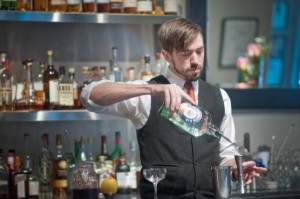Western Springs had banned the sale of alcoholic beverages since 1886. But, that was to change in 2002.

Bartender at Vie Restaurant
Since its founding in 1886, the Village of Western Springs had never allowed the sale of alcoholic beverages. While the federal government repealed its Prohibition laws in 1934, local communities were free to retain their own liquor prohibitions, as did Western Springs. Over time, Western Springs became one of just a few Chicago-area suburbs to continue prohibiting the sale of alcoholic beverages. However, an economic downturn in the 1970s forced many towns, including Western Springs, to reassess such laws. Faced with declining tax revenue, many previously “dry” towns began permitting liquor sales as a way to boost restaurant development and their resulting tax revenues.
In 1980, Western Springs voters responded to an advisory referendum by voting in favor of allowing the sale of packaged liquor. But the vote margin was very close. As a result, the village sought other ways to balance its projected budget deficit. Despite this, by 1994, other nearby towns that had allowed liquor sales were experiencing considerable success in attracting new restaurants to their towns. As a result, Western Springs’ economic development commission distributed a survey to residents asking them what businesses they would like to see in the village. This time, a surprising 84 percent indicated they would like to see the availability of either package goods sales or a restaurant serving alcoholic beverages.
While the village studied the liquor control ordinances of other nearby towns, it stumbled upon some surprising legal technicalities. First, it discovered that, since the Springdale and Ridgewood subdivisions had not been part of Western Springs when the national prohibition against liquor sales was lifted in 1934, they were technically not “dry” after all. As a result, the village quickly passed a temporary liquor control ordinance governing those parts of the village. The village also discovered that, in order to allow liquor sales in the older parts of town, it would be necessary to have 25 percent of the village’s registered voters sign a petition just in order to get the issue on the ballot! That would translate to approximately 2,000 signatures!
Assuming this could be accomplished, the voters would then have to go to the polls and endorse such a referendum proposal. To further complicate matters, the village government was prohibited from taking sides or encouraging a vote either way. Due to the difficulty of repealing the law, there was discussion about asking the state legislature to change the state law requiring so many signatures. In addition, the village investigated the possibility of becoming a “home rule” town which, among other things, would allow it to repeal the prohibition law unilaterally. After much debate, a group of citizens undertook the daunting task of obtaining the required 2,000 signatures. And, after a great deal of additional grassroots efforts, the referendum was held and the measure was approved by 60% of the voters.
Ironically, there were no immediate requests for liquor licenses from either restaurants or retail outlets. Many speculated that this was due to the ordinance being overly restrictive. But, in time, changes were made and the first license was issued in 2002 to Dominick’s grocery store on 47th Street. And, the following year, Vie Restaurant became the first to receive a license permitting liquor to be served on their premises.
